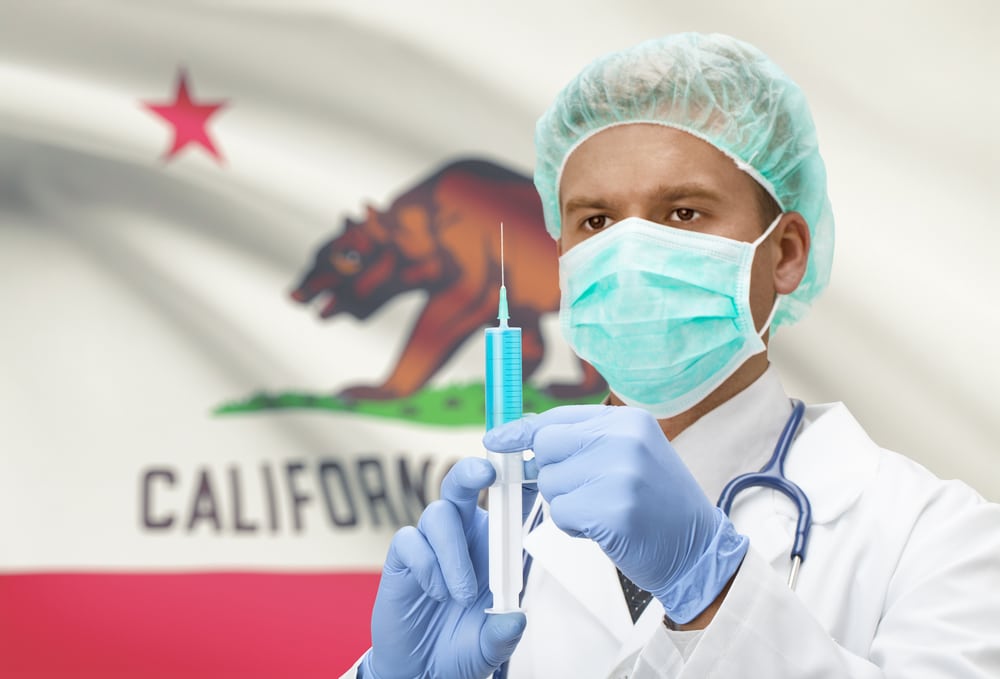How to Get Your Medical License in California

Working as a physician in California definitely has its benefits.
According to Medscape, the average physician salary in this state is above average, and the majority of physicians who practice in California feel fairly compensated.
Let’s not forget the beautiful beaches and perfect weather year round! If you’ve been considering becoming a physician in California, we don’t blame you.
However, to practice in California, you first need to get licensed. What does this process entail, and what do you need to provide?
This article will outline the eligibility requirements, application information, licensing fees, and steps to getting your medical license in California.
Eligibility Requirements Before Applying to the Medical Board of California
Before you get super psyched about moving to California, let’s make sure that you meet the eligibility requirements from California’s medical board.
Since the application fee isn’t cheap, it would be best if you ensure that you check all the boxes below before you get started.
Here they are:
Education
To be eligible to practice medicine in California, you must obtain a medical degree from an accredited school in the U.S. or Canada.
Not sure if your school meets the standards? Check this list.
For International medical graduates, your school must be listed on the World Directory of Medical Schools, and you must also get your ECFMG certification.
At this point, you are eligible for a post-graduate training license (PTL).
To transition from a post-graduate training license to a physician’s and surgeon’s license, you will need to complete 36 months of postgraduate training, with 12 months of residency.
Foreign graduates need 24 months of residency.
This postgraduate training must include four months of general medicine, and the training programs must be accredited.
U.S. training programs need to be accredited by the ACGME, and Canadian programs need to be accredited either by the Royal College of Physicians or by the CFPC.
Identification
The license requirements for identification are fairly simple. You need to have either a valid social security number or an ITIN number (Individual Tax Identification Number) to apply.
Testing
To practice medicine in any state, you must pass an exam. To be a California physician, the requirements are slightly more stringent.
Applicants must have passed the USMLE in four attempts or less.
If it took you more attempts to pass, you must meet the requirements here to be considered.
If you took Part 1 of the Licentiate of the Medical Council of Canada (LMCC) examination, you must also pass Step 3 of the USMLE.
You may also be interested in: What is Physician Credentialing?
Completing Your Application for Licensure
If you’ve met the above requirements, you are ready to begin the application process to get your physician license.
How to Complete Your Application
To complete your license application, you have two choices. You can either visit the Medical Board website to complete it online or apply by mail.
To apply by mail, you can either fill out the PDF and print it out, or download the PDF, print it, and fill it out by hand.
If you choose to fill it out by hand, make sure you write as neatly and legibly as possible. An illegible application can cause the entire process to be much more lengthy than necessary.
If you know your handwriting isn’t the best, it would be your best bet to opt for the online application. This is usually speedier, anyway, since you cut out mailing times.
Once you have the application completely filled out, mail your application along with all required documents and fees to:
Medical Board of California
2005 Evergreen Street, Suite 1200
Sacramento, CA 95815
What’s on the Application?
What can you expect to find on the application for licensure in California?
Let’s delve into this in the sections below.
Some of the information you provide will need to be corroborated by official documentation from outside sources, such as your education, training, and exam scores, but we’ll get to that later on.
Personal Information
The first section of the application will ask for your personal information that will prove your identity. This will include basic info such as your name, gender, and birthdate.
You’ll also need to provide your social security number or ITIN and your military status.
If you are active, a spouse of someone in the military, or a veteran, you may be entitled to additional benefits. We’ll cover this in more depth further in this article.
Next, the application will ask you to include your current contact information, including your mailing address, phone number, and email address.
Examination Information
You’ll also need to provide information about your medical examinations.
You’ll need to provide the name of the exam and the date you passed. You can include the USMLE, FLEX, NBME, LMCC, and/or exams from any state medical boards or other healthcare licensing boards.
Your scores will be verified through official transcripts sent by the examination boards.
Education
You’ll also be asked about your medical school enrollment.
You’ll need to prove that you are a medical school graduate by providing the name of your school(s) attended, the dates of enrollment, and the degrees obtained thereafter.
Postgraduate Training
Any internship, residency, and fellowship programs you participated in or completed should be included in your application.
You must include the facility’s name, the specialty pursued, and the training dates.
You’ll also need to add whether you received full credit, partial credit, or no credit from these programs.
Current or Past Licensure
Any out-of-state, Territory, or Province licensure that you have had or currently have will need to be shared.
You will need to include the License number and the dates held.
Disciplinary History
In this section, you will need to share any current or pending disciplinary action or board investigations against you.
You must also inform about any license revocation, suspension, or denial for any reason.
Malpractice suits and criminal records will also need to be shared.
The Department of Consumer Affairs, or DCA, will be making a thorough investigation into your history, and if they find any discrepancies or failure to disclose information, your application can be denied.
Limitations
Some circumstances are considered limitations to your ability to practice medicine.
If you are enrolled in a substance abuse program or impaired practitioner program, you must share this information.
Your application must also include any mental, physical, neurological, or behavioral impairment you have.
These limitations don’t necessarily mean you can’t practice medicine in California. You could still be eligible for a limited practice license from the state of California.
You will undergo a clinical evaluation which will determine the limitations that you must abide by. These conditions and terms are set by California’s Medical Board and are unique to your limitations.
You may also be interested in: A Guide On How to Prepare for Life After Residency
Checklist of Forms Needed
Along with your completed application, the DCA will require that you provide certain documents or supplementary forms.
You will provide some, but official individuals must provide others. For the CMB to accept these documents, they must be sent by the overseeing agencies and contain the corresponding certifications.
You will need to contact the agencies to have them send the necessary documents, but you cannot receive them yourself. They must be sent directly to the CMB.
Forms you must provide:
Forms that must be sent by others directly to the CMB:
For foreign residents or physicians:
ECFMG Certification Status Report
How Long Will the Licensing Process Take?
The California Medical Board advises that you allow six months for all processes to be completed. This is among the longest processing times in the U.S.
However, they also say they will review your application within sixty days of receiving it.
The actual processing time will depend on the accuracy of your application, the speed of all forms being submitted, and your personal circumstances.
How Much Does it Cost to Get Your Medical License in California?
California is one of the most expensive states to get licensed to practice medicine.
Application Fee
The initial application fee is $674, which includes a $49 fingerprinting fee. You need to pay this amount before they even look at your application.
It should be noted that the $625 application fee will be waived for the spouse of, or in a domestic partnership or other legal unions with, an active-duty member of the United States military.
Licensing Fee
After your application is approved, the California Medical Board will require another $888 to send you your license. This fee includes $25 for the Steven M. Thompson Physician Corps Loan Repayment Program.
The initial $863 fee is waived for the spouse of, or in a domestic partnership or other legal unions with, an active-duty member of the United States military.
You may also be entitled to a 50% reduction for those enrolled in an accredited postgraduate training program. This new total is $456.50 for a licensing fee.
How to Get an Expedited License

California will expedite the licensing process for certain individuals. This will mean that your application will be automatically sent to the front of the line for processing.
This can save months of waiting for licensure.
To get an expedited license, you must meet one of these requirements:
Honorably Discharged Veteran of the Armed Forces
Practice in Medically Underserved Areas or Populations
Intend to provide abortions within the scope of practice of your medical license;
Spouse or Domestic Partner of an Active Duty Member of the United States Armed Forces
Admitted to the United States as a Refugee, Granted Asylum, or Have a Special Immigrant Visa Status.
Reasons for Possible Denial
Some circumstances will get you an automatic denial for medical licensure in California. Some may simply require that you take care of some loose ends before they extend you a license.
To fully understand why you were denied, the California Medical Licensing Board will provide a Statement of Issues listing the very reasons for your denial.
You have the right to appeal this initial denial by providing a Notice of Defense within sixty days of receiving your denial letter.
Otherwise, you can reapply after a year has passed since your notice of denial was issued.
Common reasons for denial include:
Criminal Convictions
After you complete your application, the DCA will conduct a background check and look at public records concerning you.
Criminal convictions are considered on a case-by-case basis. Depending on the severity of the crime, you may be offered a probationary license.
Failure to Pay Taxes
If you own back taxes, you have 90 days to either pay your tax obligation or enter into a payment agreement in order to be considered for licensure.
Failure to Pay Child Support
If you owe child support, you have 150 days to comply with the DCSS before your license is denied.
You will need to provide proof of payment to the licensing board to get your license.
Disciplinary Action by an Out-of-State Board or Agency
If you had your license revoked or suspended in another state, the chances of California offering you a license are pretty slim.
Some other disciplinary actions or patterns of discipline can also result in a denial from the California Medical Board.
Does California Accept an Interstate License?
If you are already licensed in another state, you may wonder if California has adopted the Interstate Medical Licensure Compact. This could save you hundreds of dollars and simplify the licensure process.
Regrettably, California has not yet passed the Interstate Medical Licensure Compact through legislation.
Although it’s expensive and lengthy, physicians must complete this entire process before they can begin to practice medicine in this state.
Failure to do so will result in disciplinary action.
Of course, when you are moving to another state to improve your career as a physician, it’s well worth the effort.
LeverageRx can help you make this transition with the best financial protection on your side.







